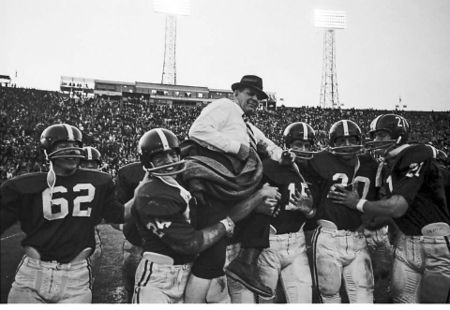1964 Iron Bowl: Difference between revisions
(New page: The '''1964 Iron Bowl''' was played on November 26 at Legion Field in Birmingham. It was the first game in the series to be broadcast on national television and occurred in the...) |
No edit summary |
||
| Line 1: | Line 1: | ||
The '''1964 Iron Bowl''' was played on [[November 26]] at [[Legion Field]] in [[Birmingham]]. It was the first game in the series to be broadcast on national television | [[File:1964 Iron Bowl victory.jpg|right|thumb|450px|Alabama players celebrate their win with Coach Bear Bryant. Photo by [[Frank Couch]]]] | ||
The '''1964 Iron Bowl''' was played on [[November 26]] at [[Legion Field]] in [[Birmingham]]. It was the first game in the [[Iron Bowl|annual series]] to be broadcast on national television. It was also notable because the [[1964 Auburn Tigers football team|Auburn Tigers]] started the season as a top-ranked contender, but had fallen to 6-3, while the [[1964 Alabama Crimson Tide football team|Alabama Crimson Tide]], led by star quarterback [[Joe Namath]], came in with surprising 9-0 record. The state was also in the midst of well-publicized defiance of [[Civil rights movement|civil rights]] advances. | |||
The 68,000 tickets were distributed equally to both schools. Thousands more people gathered outside the stadium to be close to the excitement. The national broadcast was carried on NBC. | |||
Auburn's [[Tucker Frederickson]] gave a gutsy performance, but Alabama quarterback [[Joe Namath]] and receiver [[Ray Perkins]] | Auburn led by a 7-6 score at the half. Alabama returner [[Ray Ogden]] caught the kickoff seven yards deep in his own end zone and ran untouched the length of the field for an Alabama touchdown. The play is sometimes cited as an inspiration for the football career of [[Winston Groom]]'s fictional "[[Forrest Gump]]" character. Groom was a student at Alabama in 1964, but has not confirmed any specific connection to Ogden or his 107-yard return touchdown. Auburn's All-American fullback [[Tucker Frederickson]] gave a gutsy performance, but Alabama quarterback [[Joe Namath]] and receiver [[Ray Perkins]] secured the Tide's 21-14 victory. | ||
Following a loss by Notre Dame, the final Associated Press poll, which then preceded the year-end bowl games, put Alabama in the top spot, giving them a claim to the [[List of Alabama Crimson Tide football national championships|national championship]]. The Tide went on to the Orange Bowl where they were upset by Texas 21-17. | |||
{{stub}} | {{stub}} | ||
==References== | |||
* Gray, Jeremy (November 10, 2015) 'Iron Bowl 1964 was the first nationally televised, possibly the first called Iron Bowl." {{BN}} | |||
* Edwards, Mark (November 22, 2016 ) "Iron Bowl look back: 1964." ''USA Today'' | |||
==External links== | |||
* [http://www.al.com/news/birmingham/index.ssf/2014/11/iron_bowl_64_was_first_nationa.html Photographs] from the 1964 Iron Bowl at al.com | |||
* [http://youtu.be/fzjv6mGpirs Ray Odgen's return for a touchdown] on YouTube.com | |||
{{Iron Bowl}} | {{Iron Bowl}} | ||
[[Category:1964|Iron Bowl]] | [[Category:1964|Iron Bowl]] | ||
Latest revision as of 17:55, 26 November 2017

The 1964 Iron Bowl was played on November 26 at Legion Field in Birmingham. It was the first game in the annual series to be broadcast on national television. It was also notable because the Auburn Tigers started the season as a top-ranked contender, but had fallen to 6-3, while the Alabama Crimson Tide, led by star quarterback Joe Namath, came in with surprising 9-0 record. The state was also in the midst of well-publicized defiance of civil rights advances.
The 68,000 tickets were distributed equally to both schools. Thousands more people gathered outside the stadium to be close to the excitement. The national broadcast was carried on NBC.
Auburn led by a 7-6 score at the half. Alabama returner Ray Ogden caught the kickoff seven yards deep in his own end zone and ran untouched the length of the field for an Alabama touchdown. The play is sometimes cited as an inspiration for the football career of Winston Groom's fictional "Forrest Gump" character. Groom was a student at Alabama in 1964, but has not confirmed any specific connection to Ogden or his 107-yard return touchdown. Auburn's All-American fullback Tucker Frederickson gave a gutsy performance, but Alabama quarterback Joe Namath and receiver Ray Perkins secured the Tide's 21-14 victory.
Following a loss by Notre Dame, the final Associated Press poll, which then preceded the year-end bowl games, put Alabama in the top spot, giving them a claim to the national championship. The Tide went on to the Orange Bowl where they were upset by Texas 21-17.
References
- Gray, Jeremy (November 10, 2015) 'Iron Bowl 1964 was the first nationally televised, possibly the first called Iron Bowl." The Birmingham News
- Edwards, Mark (November 22, 2016 ) "Iron Bowl look back: 1964." USA Today
External links
- Photographs from the 1964 Iron Bowl at al.com
- Ray Odgen's return for a touchdown on YouTube.com
| Iron Bowl (Alabama vs. Auburn) |
|---|
| Sites: Alabama State Fairgrounds, Bryant-Denny Stadium, Highland Park (Montgomery), Lakeview Park, Jordan-Hare Stadium, Legion Field, Riverside Park (Montgomery), and West End Park. |
| By year: 1893, 1894, 1895, 1900, 1901, 1902, 1903, 1904, 1905, 1906, 1907, 1948, 1949, 1950, 1951, 1952, 1953, 1954, 1955, 1956, 1957, 1958, 1959, 1960, 1961, 1962, 1963, 1964, 1965, 1966, 1967, 1968, 1969, 1970, 1971, 1972, 1973, 1974, 1975, 1976, 1977, 1978, 1979, 1980, 1981, 1982, 1983, 1984, 1985, 1986, 1987, 1988, 1989, 1990, 1991, 1992, 1993, 1994, 1995, 1996, 1997, 1998, 1999, 2000, 2001, 2002, 2003, 2004, 2005, 2006, 2007, 2008, 2009, 2010, 2011, 2012, 2013, 2014, 2015, 2016, 2017, 2018, 2019, 2020, 2021, 2022, 2023 |